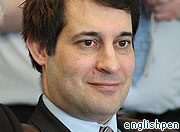Atheist doctors are almost twice as likely to make decisions which speed up the deaths of their patients than their religious colleagues, according to a new study.
The research, published in the Journal of Medical Ethics, also revealed that doctors with a strong faith were less likely to discuss treatments that would speed up their patients’ deaths.
The survey of almost 4,000 doctors showed that doctors who describe themselves as “non-religious” are more likely to have given their patients continuous deep sedation until death.
Twice
And doctors who describe themselves as “extremely” or “very non-religious” are almost twice as likely to have made such decision as compared to those with strong religious beliefs.
The research was conducted by Professor Clive Seale from the centre for health sciences at Barts and the London School of medicine and dentistry.
Baroness Finlay of Llandaff, an expert in end-of-life care, said: “It is very clear that doctors must reflect on all the influences on their decision-making, they must have insight.
“The General Medical Council is clear that as a doctor we must park as much as we can and have insight into all of those influences and try to focus and only make the decision relevant to the patient in front of us.”
Euthanasia
But campaigner Ann McPherson, from the pro-euthanasia campaign group Dignity in Dying, said: “Whilst entitled to their beliefs, doctors should not let them come in the way of providing patient-centered care at the end of life.”
And prominent atheist Dr Evan Harris claimed that the problem was with religious doctors not their atheist colleagues.
He said: “What now needs to happen is an additional effort by the medical profession and their regulators to ensure that doctors adequately consult with patients about their wishes and views and do not allow, even subconsciously, their own religious – or political, for that matter – views to distort their medical practice.”
In June it was disclosed that terminally ill patients in Belgium were being subjected to euthanasia without their consent.
A study, published in the Canadian Medical Association Journal (CMAJ), suggested that almost half of Belgium’s euthanasia deaths may be carried out on patients who have not asked for their lives to be ended.
Killing
It revealed that 248 nurses, representing almost a fifth of the nurses interviewed, had cared for euthanasia patients.
And nearly 50 per cent of these, some 120 nurses, had been involved in killing patients without their “explicit request”.
And in May the General Medical Council (GMC) released controversial new guidance stating that terminally ill patients should be allowed to commit suicide by turning down food and fluids.
Culture of death
The GMC’s guidelines alarmed critics who described them as part of a creeping “culture of death”.
The guidance requires doctors to obey patients’ wishes even if this means that the patient refuses food and hydration which could prolong their life.
But critics warned that food and water should be considered as care rather than medical treatment.
And even if a patient requested to be artificially fed until the point of death a doctor could overrule their wishes if they believed the process was causing the patient harm or discomfort, providing they got a second opinion.

